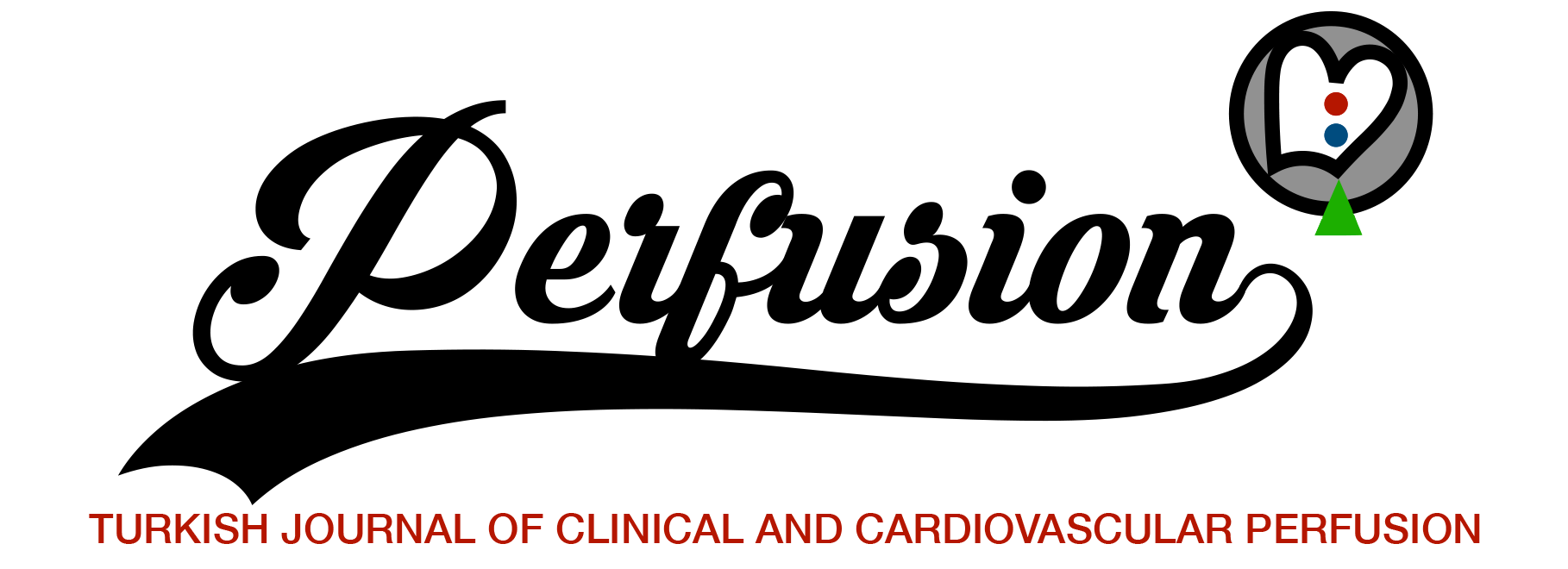ABSTRACT
Objective:
The relationship between serum uric acid level and pump duration and acute kidney injury (AKI) in cardiac surgery is highly effective on mortality, morbidity and hospital stay. It is important to consider preoperative uric acid and pump time in early detection and risk stratification of AKI. From this point of view, in this study, it is aimed to examine the effect of perfusion time on the development of AKI in patients with high preoperative serum uric acid levels.
Materials and Methods:
In this retrospective study, 104 patients were examined between January and December 2017, after obtaining the necessary permission from University of Health Sciences Turkey, Kartal Koşuyolu Yüksek İhtisas Training and Research Hospital. First group (n=67) patients with a pump duration of 100 minutes or more 2. group (n=37) patients with pump time less than 100 minutes were included.
Results:
In this study, 26.9% of the patients in group 1 with a pump time of 100 minutes and ↑ developed AKI, 73.1% of them did not, and 8.1% of the patients in group 2 with a pump time of 100 minutes ↓ it was determined that AKI developed in 91.9% of the patients and it did not develop in 91.9% of them, and it was found to be significant (p<0.05).
Conclusion:
In patients with high uric acid in the preoperative period, it was determined that the pump duration of 100 minutes and ↑ had a statistically significant effect on the development of AKI andit was more risky in terms of AKI. In addition, in our study, it was determined that the prolongation of the aortic cross clamp time is among the factors that cause the development of AKI. Before open heart surgery, it is important to pay attention to the pump and aortic cross clamp duration and to take precautions accordingly in patients with a serum uric acid value above 6 mg/dL.
Keywords:
Acute renal failure, extracorporeal circulation, coronary artery bypass surgery, serum uric acide, perfusion time
References
1Andrassy KM. Comments on ‘KDIGO 2012 Clinical Practice Guideline for the Evaluation and Management of Chronic Kidney Disease’. Kidney Int 2013;84(3):622-623
2Kellum JA. Acute kidney injury. Crit Care Med 2008;36(4 Suppl):S141-S145.
3Mancini E, Caramelli F, Ranucci M, Sangiorgi D, Reggiani LB, Frascaroli G, et al. Is time on cardiopulmonary bypass during cardiac surgery associated with acute kidney injury requiring dialysis? Hemodial Int 2012;16(2):252-258.
4Mehta RL, Kellum JA, Shah SV, Molitoris BA, Ronco C, Warnock DG, et al. Acute Kidney Injury Network: report of an initiative to improve outcomes in acute kidney injury. Crit Care 2007;11(2):R31.
5Ayyıldız SN. Ürik Asit Yüksekliğinin Analizi. J Acad Res Med 2016;6:74-77.
6Maiuolo J, Oppedisano F, Gratteri S, Muscoli C, Mollace V. Regulation of uric acid metabolism and excretion. Int J Cardiol 2015;213:8-14
7Ejaz AA, Beaver TM, Shimada M, Sood P, Lingegowda V, Schold JD, et al. Uric acid: a novel risk factor for acute kidney injury in high-risk cardiac surgery patients? Am J Nephrol 2009;30(5):425-9.
8Kuwabara M, Bjornstad P, Hisatome I, Niwa K, Roncal-Jimenez CA, Andres-Hernando A, et al. Elevated Serum Uric Acid Level Predicts Rapid Decline in Kidney Function. Am J Nephrol 2017;45(4):330-337
9Feig DI, Kang DH, Johnson RJ. Uric acid and cardiovascular risk. N Engl J Med 2008;359(17):1811-1821.
10Kaufeld T, Foerster KA, Schilling T, Kielstein JT, Kaufeld J, Shrestha M, et al. Preoperative serum uric acid predicts incident acute kidney injury following cardiac surgery. BMC Nephrol 2018;19(1):161.
11Karim HM, Yunus M, Saikia MK, Kalita JP, Mandal M. Incidence and progression of cardiac surgery-associated acute kidney injury and its relationship with bypass and cross clamp time. Ann Card Anaesth 2017;20(1):22-27.
12Kumar AB, Suneja M, Bayman EO, Weide GD, Tarasi M. Association between postoperative acute kidney injury and duration of cardiopulmonary bypass: a meta-analysis. J Cardiothorac Vasc Anesth 2012;26(1):64-69.
13Taniguchi FP, Souza AR, Martins AS. Cardiopulmonary bypass time as a risk factor for acute renal failure. Rev Bras Cir Cardiovasc 2007;22(2):201-205.
14Fischer UM, Weissenberger WK, Warters RD, Geissler HJ, Allen SJ, Mehlhorn U. Impact of cardiopulmonary bypass management on postcardiac surgery renal function. Perfusion 2002;17(6):401-406.
15Munir MU, Khan DA, Khan FA, Shahab Naqvi SM. Rapid detection of acute kidney injury by urinary neutrophil gelatinase-associated lipocalin after cardiopulmonary bypass surgery. J Coll Physicians Surg Pak 2013;23(2):103-106.
16Tuttle KR, Worrall NK, Dahlstrom LR, Nandagopal R, Kausz AT, Davis CL. Predictors of ARF after cardiac surgical procedures. Am J Kidney Dis 2003;41(1):76-83.
17Provenchère S, Plantefève G, Hufnagel G, Vicaut E, de Vaumas C, Lecharny JB, et al. Renal dysfunction after cardiac surgery with normothermic cardiopulmonary bypass: incidence, risk factors, and effect on clinical outcome. Anesth Analg 2003;96(5):1258-1264.
18McCullough PA, Soman SS, Shah SS, Smith ST, Marks KR, Yee J, et al. Risks associated with renal dysfunction in patients in the coronary care unit. J Am Coll Cardiol 2000;36(3):679-84.
19Santos FO, Silveira MA, Maia RB, Monteiro MD, Martinelli R. Acute renal failure after coronary artery bypass surgery with extracorporeal circulation -- incidence, risk factors, and mortality. Arq Bras Cardiol 2004;83(2):150-154.
20Sirvinskas E, Benetis R, Raliene L, Andrejaitiene J. The influence of mean arterial blood pressure during cardiopulmonary bypass on postoperative renal dysfunction in elderly patients. Perfusion 2012;27(3):193-198.
21Wagener G, Jan M, Kim M, Mori K, Barasch JM, Sladen RN, et al. Association between increases in urinary neutrophil gelatinase-associated lipocalin and acute renal dysfunction after adult cardiac surgery. Anesthesiology 2006;105(3):485-491.
22Chertow GM, Lazarus JM, Christiansen CL, Cook EF, Hammermeister KE, Grover F, et al. Preoperative renal risk stratification. Circulation 1997;95(4):878-884.
23Karkouti K, Wijeysundera DN, Yau TM, Callum JL, Cheng DC, Crowther M, et al. Acute kidney injury after cardiac surgery: focus on modifiable risk factors. Circulation 2009;119(4):495-502.
24Loef BG, Epema AH, Smilde TD, Henning RH, Ebels T, Navis G, et al. Immediate postoperative renal function deterioration in cardiac surgical patients predicts in-hospital mortality and long-term survival. J Am Soc Nephrol 2005;16(1):195-200.
25Che M, Xie B, Xue S, Dai H, Qian J, Ni Z, et al. Clinical usefulness of novel biomarkers for the detection of acute kidney injury following elective cardiac surgery. Nephron Clin Pract 2010;115(1):c66-c72.
26Metnitz PG, Krenn CG, Steltzer H, Lang T, Ploder J, Lenz K, et al. Effect of acute renal failure requiring renal replacement therapy on outcome in critically ill patients. Crit Care Med 2002;30(9):2051-2058.
27Machado MN, Nakazone MA, Maia LN. Prognostic value of acute kidney injury after cardiac surgery according to kidney disease: improving global outcomes definition and staging (KDIGO) criteria. PLoS One 2014;9(5):e98028.
28Mangos GJ, Brown MA, Chan WY, Horton D, Trew P, Whitworth JA. Acute renal failure following cardiac surgery: incidence, outcomes and risk factors. Aust N Z J Med 1995;25(4):284-289.
29Zanardo G, Michielon P, Paccagnella A, Rosi P, Caló M, Salandin V, et al. Acute renal failure in the patient undergoing cardiac operation. Prevalence, mortality rate, and main risk factors. J Thorac Cardiovasc Surg 1994;107(6):1489-1495.
30Palomba H, de Castro I, Neto AL, Lage S, Yu L. Acute kidney injury prediction following elective cardiac surgery: AKICS Score. Kidney Int 2007;72(5):624-631.
31Mithiran H, Kunnath Bonney G, Bose S, Subramanian S, Zhe Yan ZN, Zong En SY, et al. A Score for Predicting Acute Kidney Injury After Coronary Artery Bypass Graft Surgery in an Asian Population. J Cardiothorac Vasc Anesth 2016;30(5):1296-1301.
32Abel RM, Buckley MJ, Austen WG, Barnett GO, Beck CH Jr, Fischer JE. Etiology, incidence, and prognosis of renal failure following cardiac operations. Results of a prospective analysis of 500 consecutive patients. J Thorac Cardiovasc Surg 1976;71(3):323-333.
33Slogoff S, Reul GJ, Keats AS, Curry GR, Crum ME, Elmquist BA, et al. Role of perfusion pressure and flow in major organ dysfunction after cardiopulmonary bypass. Ann Thorac Surg 1990;50(6):911-918.
34Carson JL, Scholz PM, Chen AY, Peterson ED, Gold J, Schneider SH. Diabetes mellitus increases short-term mortality and morbidity in patients undergoing coronary artery bypass graft surgery. J Am Coll Cardiol 2002;40(3):418-423.
35Hashimoto K, Miyamoto H, Suzuki K, Horikoshi S, Matsui M, Arai T, et al. Evidence of organ damage after cardiopulmonary bypass. The role of elastase and vasoactive mediators. J Thorac Cardiovasc Surg 1992;104(3):666-673.
36Conlon PJ, Stafford-Smith M, White WD, Newman MF, King S, Winn MP, et al. Acute renal failure following cardiac surgery. Nephrol Dial Transplant 1999;14(5):1158-1162.
37Thakar CV, Arrigain S, Worley S, Yared JP, Paganini EP. A clinical score to predict acute renal failure after cardiac surgery. J Am Soc Nephrol 2005;16(1):162-168.
38Star RA. Treatment of acute renal failure. Kidney Int 1998;54(6):1817-1831.
39Bonventre JV, Weinberg JM. Recent advances in the pathophysiology of ischemic acute renal failure. J Am Soc Nephrol 2003;14(8):2199-2210.



